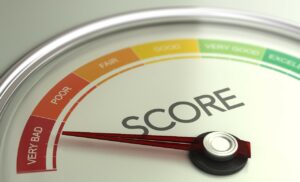Credit is a tool that lenders use to assess a borrower’s creditworthiness. Usually, credit evaluations happen before extending financing. Lenders extend credit, if they deem you trustworthy, for a fee which is a rate of interest. The amount of credit accessible to you depends on how reliable you appear to creditors.
Your credit score is a numeric value of your level of trustworthiness to lenders. Creditors use your credit score to assess the risk of lending to you. If your credit history is poor, your credit score is lower.
Poor credit arises from a history of missed payments or insolvency. If your credit history is favourable, then your credit score is higher. Good credit arises from a history of full, complete payments and healthy money habits.
If your credit rating is low, you will likely have limited options for financial products. Even if approved, those products will often come at a higher cost. Luckily, it’s possible to improve your credit score and rebuild your credit. Let’s take a look below.
What affects your credit score?
Credit bureaus in Canada, Equifax and TransUnion, calculate your credit score. But they don’t share the exact formula they use in disclosures. You can’t know for sure how much impact a certain action has on your credit score.
In addition, positive financial habits take time to reflect on your credit. However, there are general pieces of information that factor into the calculation:
Payment history. Missed or late bill payments negatively affect credit scores. Creditors see your payment history as a strong predictor of how you’ll handle future debt. On-time bill payments positively affect credit scores. Consider setting reminders for yourself to meet your payment deadlines effectively.
Insolvency. A bankruptcy or consumer proposal stays on your credit report for roughly 6 years. Multiple insolvency records stay on your credit report for approximately 14 years. If you’ve had insolvency in the past, learn from your mistakes to move forward.
Credit utilization ratio. A credit utilization ratio demonstrates the amount of credit you have available compared to the debt you hold. It is also referred to as a debt to credit ratio. A high credit utilization ratio gives the impression that you’re a high-risk borrower. Credit utilization ratios should be under 30%. This will minimize negative effects on your credit score.
Types of credit. Your diversity of credit impacts your credit score. For positive results, you should demonstrate a diverse mix of credit types. Including credit cards, mortgages, car loans and so on. Note that you should only take on other types of credit if you can afford it. Taking on credit you can’t pay back will have a worse effect on your score.
Length of credit history. A longer history of responsible credit management looks good to lenders. If most of your credit accounts are recent, your history is short, which can lower your credit score. If you have a credit card that you haven’t used in a while, don’t cancel it. Consider using it for one purchase a month to continue demonstrating strong credit.
Steps to rebuild credit
Rebuilding credit takes effort and time. It requires attention to detail, discipline, and sometimes, professional consultation. Rebuilding credit won’t look the same for everyone. Each individual will face different challenges due to their specific circumstances.
Below are helpful steps for building credit:
Check your credit score and report
Awareness is the first step to rebuilding credit. If you haven’t checked your credit score or report in a while, request a free credit report from both bureaus. You can obtain one free report each year. Alternatively, use a credit score app to assess the situation.
Checking your credit score also makes you aware of any discrepancies and errors. Sometimes credit bureaus or reporting institutions make mistakes. Rectifying any financial errors will improve your credit.
Define your goals
Why do you want to improve your credit? Are you preparing for a substantial purchase? Do you want cheaper credit? Clearly defining your goals will help you create a plan, stay on track and feel motivated.
Get a secured credit card
Secured credit cards require a deposit to use. The deposit becomes the credit limit. Lenders can seize the deposit if you fail to pay your credit card bill on time and in full. Designed for individuals who can’t access an unsecured credit card.
This financial product will kick start your credit-building journey. Be sure to use it responsibly and you will likely obtain a regular credit card soon.
Make payments on time
On-time payments are an important factor in your credit score calculation. Make all payments on time and in full. Minimum payments are better than no payment. But always paying on time and in full will have a greater impact on your credit score.
Repay old debts
If you have a large sum of debts outstanding, begin paying it down. There are various tactics to do this, such as the snowball and avalanche method. Whatever plan you come up with, be sure to stick to it and make more than the minimum payment.
Consider debt counselling
In some cases, your debt and bad credit situation might be overwhelming. If you’re feeling stuck, consider reaching out to a debt counsellor.
How long will it take to rebuild credit?
The length of time required to build credit varies for everyone. Your initial credit score, financial goals, commitment and budget all affect the timeline. But one thing is certain. If you enhance your financial habits, they will eventually reflect in your credit. Maintain patience and stick to good money habits.
Negative information can remain on your report for years. However, that doesn’t mean you should give up. Once the insolvency, collections accounts or other negative items drop off, the positive things will shine through.
Seek help when you need it
It takes time to build credit. Patience and dedication to good financial habits is key. If you struggle to improve your credit score on your own, talk to a credit counsellor at (844)-402-3073 today.




